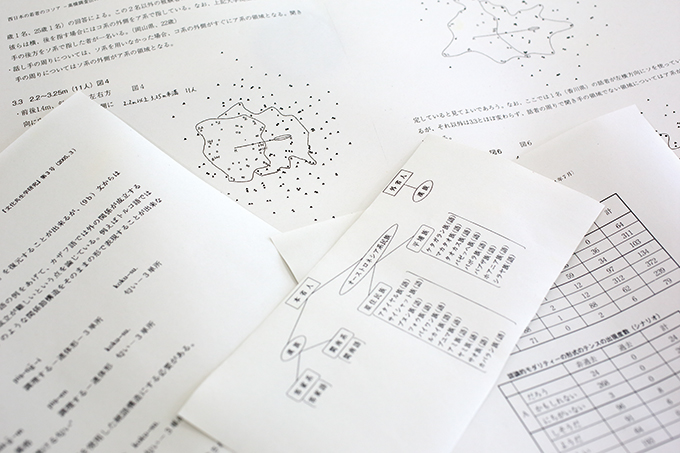Language and Culture

Linguistics and Modern Japanese Studies
There are 6,000 languages in the world, all of which have precise mechanisms. Even if we use a language without thinking about it, there are reasons, rules, and mechanisms behind its usage. Even within the Japanese language, there are regional dialects and differences in the way people of different generations speak. Through observation of language through fieldwork, interviews, questionnaires, and linguistic analysis using databases, we will clarify the mechanisms, regularities, and diversity of language.
Japanese Language and Literature
Japanese Linguistics studies how the Japanese language has changed from ancient times to the present through analysis of literary sources, modern language, and dialects. In Japanese Literature, students deepen their understanding of Japanese literary works such as waka poems, stories, and novels, or adjacent genres, while also taking into consideration the culture, society, and thought that support these works. Japanese linguistics is the foundation for understanding literature, and Japanese literature is an essential resource for Japanese linguistics.
Chinese Language and Culture
China boasts a long history and tradition. Over the course of its 4,000 years of history, China has accumulated a diverse and extensive cultural heritage. In the field of Chinese Language and Culture, we conduct research on language, literature, thought, and culture. In addition to understanding the structure of the Chinese language, we will also delve into Chinese culture, which has had a profound influence on both Asia and Europe, through the poetry of Tao Yuanming and Bai Le Tian, novels such as Romance of the Three Kingdoms and Journey to the West, and contemporary novels, plays, films, and cartoons.
English Language and Culture
Studying English and English-speaking literature at university is not just about acquiring the skills and knowledge to speak English. It is about learning theories and methods to scientifically elucidate the mechanisms of the English language, the structures and theories that make up Anglo-American fiction, poetry, and drama, their cultural and social backgrounds, and their similarities and differences with other art forms such as film and jazz. Of course, a deep understanding of language and culture will also contribute to the improvement of your English language skills.
French Language and Culture
French culture is imbued with a keen and sometimes acerbic insight into the human condition and a special sense of the beauty of the language that expresses it. In French Language and Culture, students learn about the structure of the modern French language as contrasted with English and Japanese, and the various genres of literature (poetry, novels, plays, essays, etc.). Students will also learn about French culture through movies, BD (comics), opera, chansons, French pop, etc.
German Language and Culture
German culture transcends the boundaries of time and space, and speaks directly to us with its deep love and insight into mankind and nature. In the field of German Language and Culture, students will not only understand the structure of the German language, but will also consider the relationship between literature, from Goethe and Schiller to Kafka and Ende, and the society that produced it, and will also enter the world of German culture through music, painting, and film from German-speaking countries.
